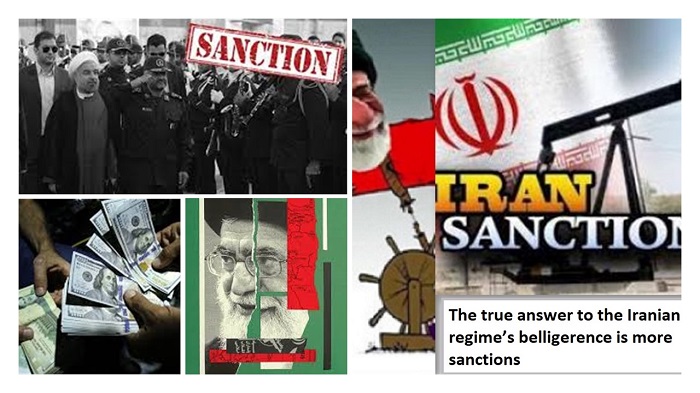
Iran is no stranger to sanctions, but the current sanctions are harder for the regime to circumvent. The current United States administration has taken heed of past mistakes and is cracking down hard on the belligerent and criminal Iranian regime. During periods of appeasement by the West, most notably that of the Obama administration, Iran was able to get around sanctions with very little consequences. Its malign activities, therefore, were hardly impacted.
The West ignored Iran’s malign activities in the hope that the regime would become more moderate. But appeasement was a total failure because it just empowered the regime. The Trump administration is not making the same mistakes and we can see this approach working, especially in terms of its reduction in exports, including oil exports.
Statistics indicate that around a third of the regime’s non-oil exports have decreased as a result of sanctions, and more lately the Coronavirus health crisis.
In the past, the Iranian regime used to boast that sanctions will not stop the regime because it is used to such action and it knows how to get around them. The country’s Supreme Leader once said that Iran has been “vaccinated against sanctions” and emphasized that sanctions “do not hurt” the regime. He even warned the international community that “sanctions will be nullified” and that thanks to the United States they work in the regime’s favor.
Iran eventually got sanctions relief and the Joint Comprehensive Plan of Action (JCPOA), or Iran nuclear deal, and it took the opportunity to further advance with its belligerent activities. Until Trump took office – a devastating blow to the regime.
#Iranian regime’s recent decision to artificially alter the country’s exchange rate and argued that this action would result in increasing poverty and rising social unrest.https://t.co/hyLX2OODg0#Iran #MEK #COVIDー19 #coronavirus @USAdarFarsi pic.twitter.com/NGhSgR4tYZ
— MEK Iran (Mujahedin-e Khalq) (@MEK_Iran) May 13, 2020
Iranian media is now reporting on the difficulties that it faces with exports and has highlighted that neighboring markets have been lost. Tejarat daily wrote that the loss of several countries has had a massive impact on exports.
The Central Bank of Iran has increased its foreign exchange liabilities to 100 percent (from 80 percent) because it is clear the government is going to be unable to return the currencies from exports. The government has already made it clear that it does not know how much will be returned to the country from its private sector exports that are worth around $10 billion.
The country’s first vice president has called on all government agencies to bring in $35 billion in foreign exchange exports to alleviate the economic issues the government faces. The national income of the country is getting smaller and the people’s share of it is dropping dramatically.
However, the regime is digging itself into an even bigger hole that it will be impossible to get out of. The people are aware of this and they are (quite rightly) disgusted at the situation they are being left in. Poverty is increasing, as is unemployment. Purchasing power is declining and the Iranian regime is to blame. The regime’s fears about an imminent uprising are justified because the people cannot ignore the crisis that the regime is making worse.
The eliminated head of the Quds Force, #QassemSoleimani, was directly involved in the violent crackdown on #Iran’s student protests in 1999 and nationwide protests in 2009https://t.co/v1BlZDZ5Fn#IranProtests @USAdarFarsi #FreeIran2020 pic.twitter.com/tOBos6QXm8
— MEK Iran (Mujahedin-e Khalq) (@MEK_Iran) February 12, 2020
The main opposition to the Iranian regime MEK Iran, and the National Council of Resistance of Iran (NCRI), published a report last year detailing the activities carried out by the Holy Shrines’ Reconstruction Headquarters and revealed that it is used as a front organization for the IRGC’s Qods Force.







